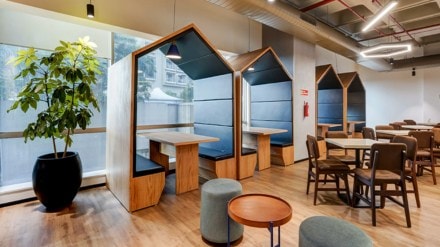Coworking startup Awfis has set a target of 30% revenue growth in FY25. “This is the kind of growth target we are very comfortable getting around,” Sumit Lakhani, deputy CEO, Awfis Space Solutions, told FE.
The company’s revenue from operations grew 55.8% year-on-year to `849 crore in FY24 and it also turned profitable in the fourth quarter. The startup also made its debut on the bourses in May this year.
Awfis is also targeting a 40% seat expansion by the end of the current fiscal. As of March 2024, it had 181 centres across 17 cities totalling 95,000 operational seats. It plans to add around 40,000 in FY25, reaching a total of around 135,000 operational seats by the end of FY25.
The Delhi-headquartered startup was founded by Amit Ramani in 2015 and is backed by marquee investors such as PeakXV and Chyscapital.
Awfis credits its growth so far to its managed aggregation model, under which it partners with institutional landlords on a profit-sharing basis. This, it claims, has helped the startup stay capital-light. “When we started this business, we realised that on the one hand, we had to sign a very long-term lease–of around 5-9 years–with the space owners, and on the other, 6 months to 1-year lease with the clients,” Lakhani explained.
“This is because the value proposition we offer to clients is flexibility. But this way, there was a huge mismatch and we had to bear the challenge of occupancy build-up,” he added.
For every centre, a substantial amount of capital is required to create a coworking environment. This makes it an asset-heavy model. To overcome this challenge, the team came up with the managed aggregation model, wherein the space owner invests about 50-90% of the capital and the rest is done by Awfis.
“We also give a minimum guarantee to the space owner, which is generally structured at about 50% of the market rental. It starts from the sixth or the ninth month of operation so that we get an occupancy build-up period. This way, instead of giving a fixed rental to the space owner, we offer a formula which is a percentage of profit or minimum guarantee, whichever is higher,” he said.
Around 66% of Awfis’ properties today are operated under the managed aggregation model. The space owners of these properties usually include large developers and high net worth individuals (HNIs) owning real estate, among others.
The startup also claims that its key differentiator is its tier-2 strategy and plans to scale its network in these cities. “We were one of the early coworking operators to expand into tier-2 cities. The first city we expanded to was Chandigarh in 2018,” the deputy CEO said.
Currently, the firm is present in eight tier-2 cities and plans to add one or two more this year. About 90% of the company’s seats are now present in tier 1 and about 10% in tier 2. According to the company, this could change to 85% and 15% (approximately) in the coming years. “I will not be surprised to see it happening this year itself,” Lakhani said.
The increasing demand in tier-2 cities is coming from four different segments–large corporates, IT services, local businesses, and global capability centres (GCCs).
“Large corporates who already have a presence across metros are now looking at tier 2 for their satellite and regional offices. Demand from IT services companies is also increasing because a lot of talent wants to be closer to home,” he added.
The startup is particularly excited about the interest coming from GCCs. “Right now, GCCs are more focused on metro cities, but they are very actively exploring the talent pool around a few tier-2 cities,” Lakhani said.
He said the company has lately been engaging with a lot with GCCs. “What we have seen is that in the initial stages, the demand from global capability centres is for 25-50 seats. But they expand rapidly, growing from about 25-250 seats in a year.”
During the pandemic, Awfis also added allied services such as IT solutions, food and designing for office spaces. Today, 10% of its revenue comes from these services. Allied services will continue to be a strong focus area for the startup. “Think of a GCC. Our teams provide dedicated concierge for them, to manage their fleet, travel, stay, IT services, food and beverage and pantry, among other things. From an occupier’s perspective, this is an added advantage. For us, it creates more stickiness for our product and helps us drive growth,” he said.
In the long term, the startup aims to expand these services and become an integrated platform for all commercial real estate needs for the occupiers. “The idea is to create an end-to-end platform that is not only restricted to coworking but provides a complete gamut of services under one roof. This is the kind of value proposition we are looking at over the next five years,” Lakhani said.
